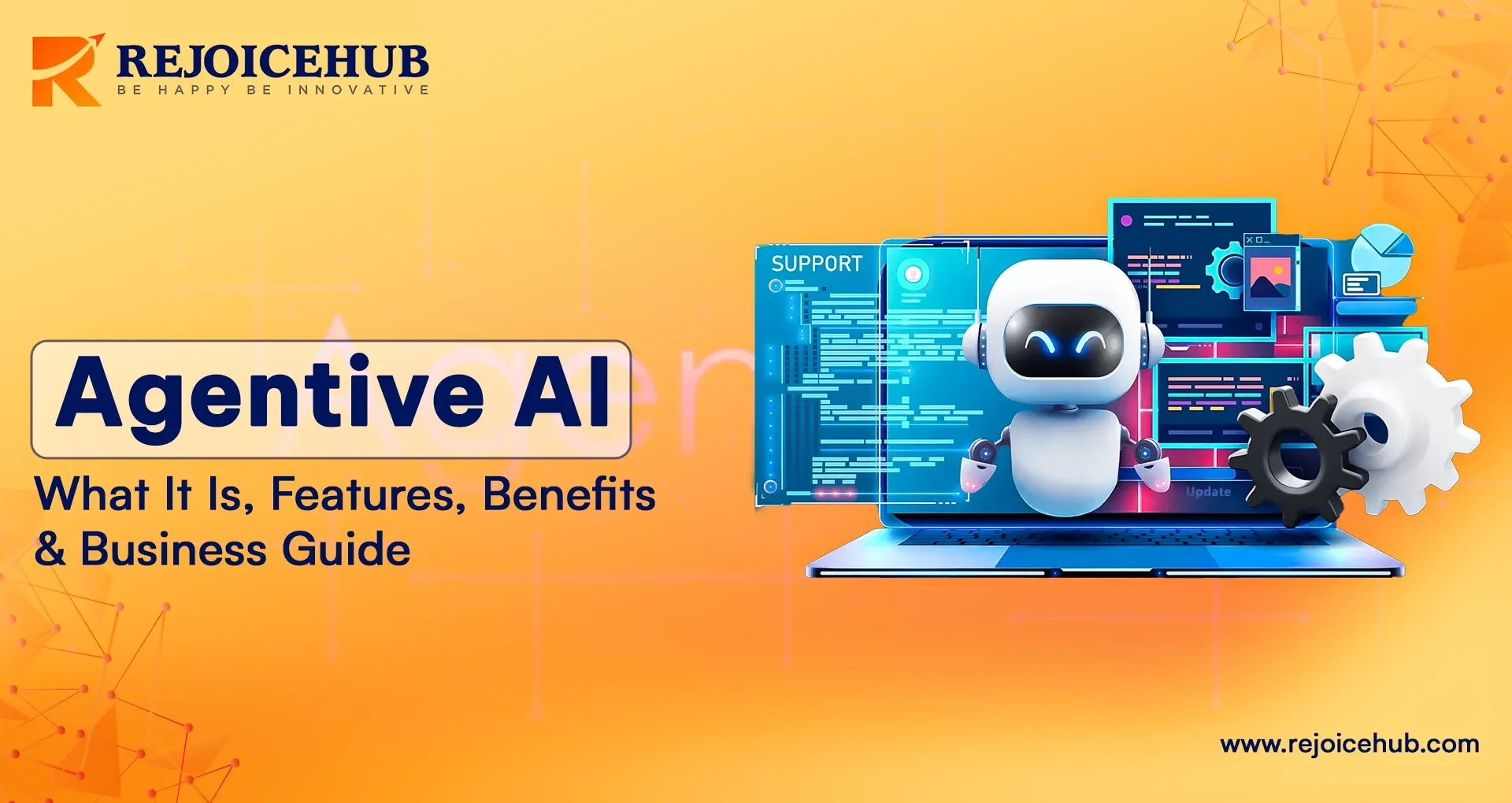
Think about the tools you use on a daily basis, whether it’s your smartphone assistant, your e-commerce guidance tool, or your favourite chatbot. And most of these systems use traditional AI.
But Artificial Intelligence has become so advanced these days that it doesn’t just wait for a command, it actually takes the initiative, and can predict what you need next or what the safe boundaries are. And this AI is constantly learning, which is what we call Agentive AI.
Conventional AI is mostly reactive, but Agentive AI is designed to act autonomously while staying aligned with human goals. This blends with decision-making, adaptability, and human-aware boundaries, making it more reliable for businesses. This is why many industries are shifting towards Agentive AI, as it not only increases their efficiency but also delivers proactive results, due to which customers get personalized user experiences.
In today’s detailed article, we will discuss Agentive AI, its core features, use cases and challenges so that you can deploy it in your system without any tension.
Quick Summary
Agentive AI is going to be the next evolution of artificial intelligence. Traditional AI primarily reacts to user input, but Agentive AI takes the initiative and autonomously executes tasks accordingly and adapts itself to the system through continuous learning. And it operates within human-defined boundaries to maintain clarity, transparency, and trust.
Agentive AI can make decisions autonomously with context awareness, proactive assistance, and feedback-driven learning. Agentive AI is transforming all industries from healthcare to finance and many more businesses that use AI. Their productivity increases significantly..
I found Agentive AI quite reliable compared to static automation, because it is always ready for learning so that it can achieve business goals.
Our Focus in this article:
1. What is Agentive AI and how does it work?
2. How is Agentive AI different from traditional AI?
3. What are the core features and use cases of Agentive AI?
4. What are the challenges of deploying Agentive AI, and what are its future trends?
What is Agentive AI?
Agentive AI is a smart system of artificial intelligence designed to assist or act according to human goals. While traditional automation follows rigid rules, Agentive AI adapts itself to the situation, learns from outcomes, and executes decisions with minimal human intervention.
I have tested a lot of early prototypes of Agentive AI, and I personally felt that the system not only makes better recommendations, but it also executes actions on your behalf.
For example: Agentive AI, instead of replying to your email, will automatically draft a reply which you will find very personalized, and it can even schedule a meeting on its own, that too at the right time. You can think of it as a smart employee who not only understands what you say but also tries to make decisions according to your objectives and handles repetitive and context-aware tasks reliably.
The best thing I found about Agentive AI is that it never crosses its boundaries, and most of its working mechanisms are very transparent and remain within the limits set by humans.
Core Differences Between Traditional AI and Agentive AI
When I first started experimenting with AI systems, I quickly realized that traditional AI often feels like a calculator; it gives you outputs based on your inputs. But agentive AI feels more like a co-worker, so let's understand Agentive AI in more detail.
Here’s how they differ:
-
Traditional AI is reactive. It waits for user input, processes data, and responds with a predefined output. Chatbot is its best example, which works according to a set of rules. And reactive AI does not work on recommendation systems or predictive models; rather, it takes static decisions as per its design.
-
Agentive AI is proactive and adaptive. It anticipates user needs, continuously learns, and even takes initiative.
For example, instead of a customer support bot that only answers questions, agentive AI might automatically flag a recurring billing issue and resolve it before the user complains. For this reason, businesses give more preference to Agentive AI.
In short, traditional AI is useful in assisting as it is reactive, whereas Agentive AI is proactive as it can give dynamic output and can also evolve itself according to previous data and history.
Key Characteristics of Agentive AI
If you want to understand Agentive AI in detail, then you must understand its core characteristics, because this will give you a lot of information about its mechanisms.
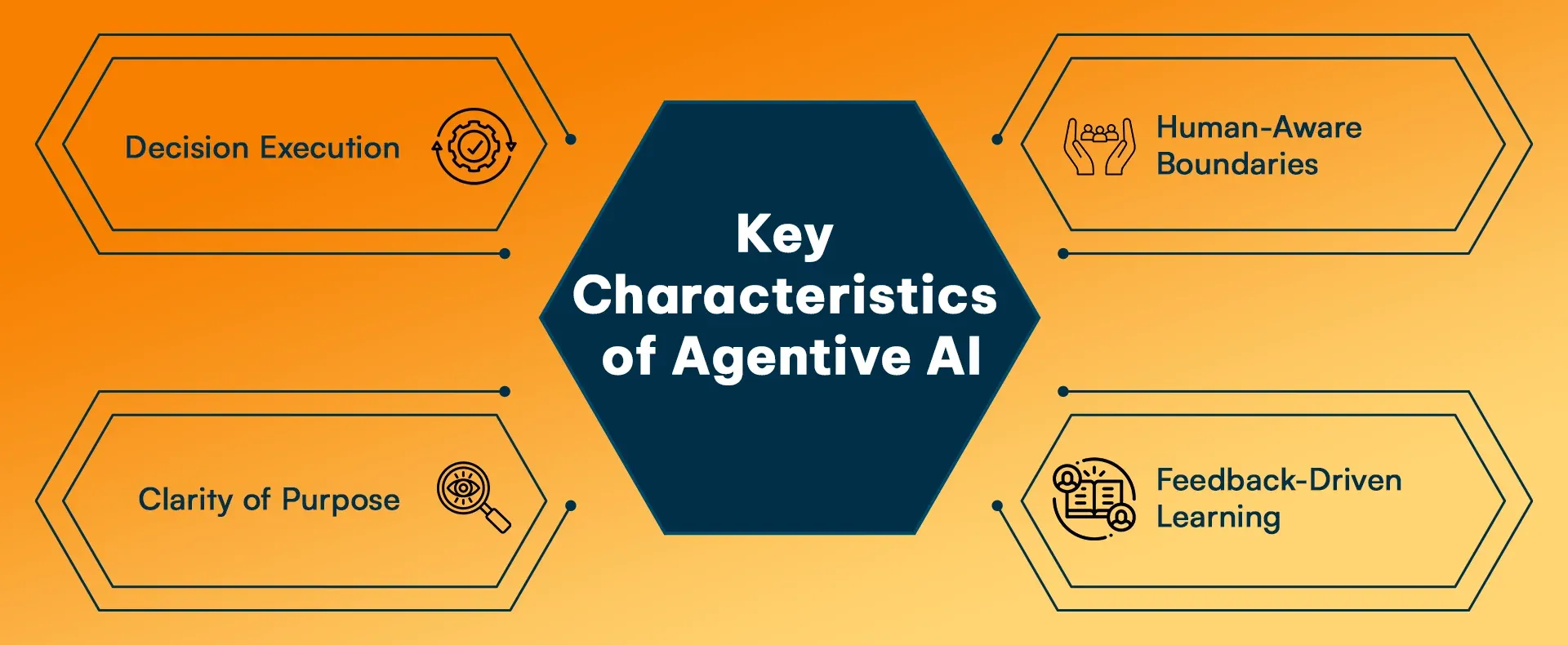
1. Decision Execution: The working model of Agentive AI is not limited, but it is quite flexible according to the situation, and it not only carries out analysis but also automatically handles important tasks, such as refund processing or adjusting workflows in the back-end.
2. Clarity of Purpose: Agentive AI works around predefined goals and integrates with the workflow of the business to achieve those goals, thus improving clarity in business.
3. Human-Aware Boundaries: Agentive AI respects human-created boundaries, and the system will not overstep into areas that require human judgment unless designed to. This is why the error rate of Agentive AI is very low.
4. Feedback-Driven Learning: Agentive AI advances over time and stores data about every decision it makes to make itself smarter, and it also refines its own data, thereby enhancing its performance significantly due to feedback.
These qualities make agentive AI more trustworthy and dependable, especially in business environments where accountability matters as much as efficiency.
Key Features of Agentive AI
When I was exploring Agentive AI, I saw 4 set features in Agentive AI. Let’s understand the core features of Agentive AI, as it will give you a lot of ideas about its mechanism.
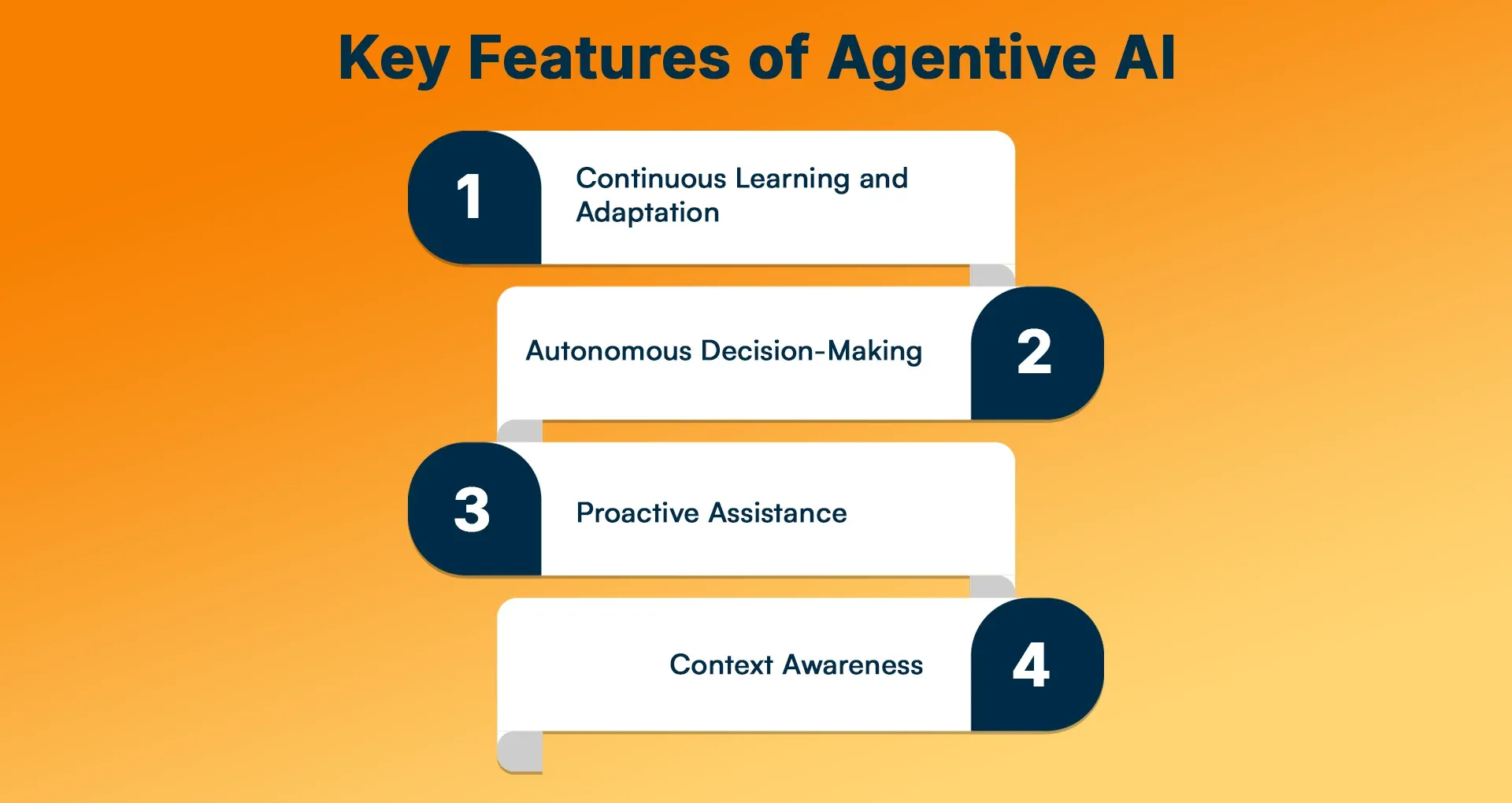
1. Continuous Learning and Adaptation: As we know, static AI models work on a fixed path and set of rules, but Agentive AI evolves with time. And it evolves with data and user interactions, and it also helps you a lot in scaling your business.
2. Autonomous Decision-Making: Agentive AI analyzes the scenarios and takes actions accordingly without waiting for manual prompts. Tesla cars also have autonomous decision making capabilities, which is why they are capable of self-driving.
3. Proactive Assistance: This can be called a system that can predict future issues in project management and fix any issue before it gets escalated. This is why Agentive AI is called proactive, because it is very dynamic.
4. Context Awareness: I like these capabilities of Agentive AI a lot because it has very high context awareness and can make decisions autonomously according to environmental, emotional, and situational cues.
All these features together not only help Agentive AI in automation but also have self-decision making capabilities, due to which it is used a lot in many core industries like finance, healthcare and logistics.
Also Read: What is AI Automation? All You Need to Know
The Technical Foundation of Agentive AI
When I experimented with small agentive models, I realized that to make any agentive model strong, its technical part should be very strong so that errors can be avoided.
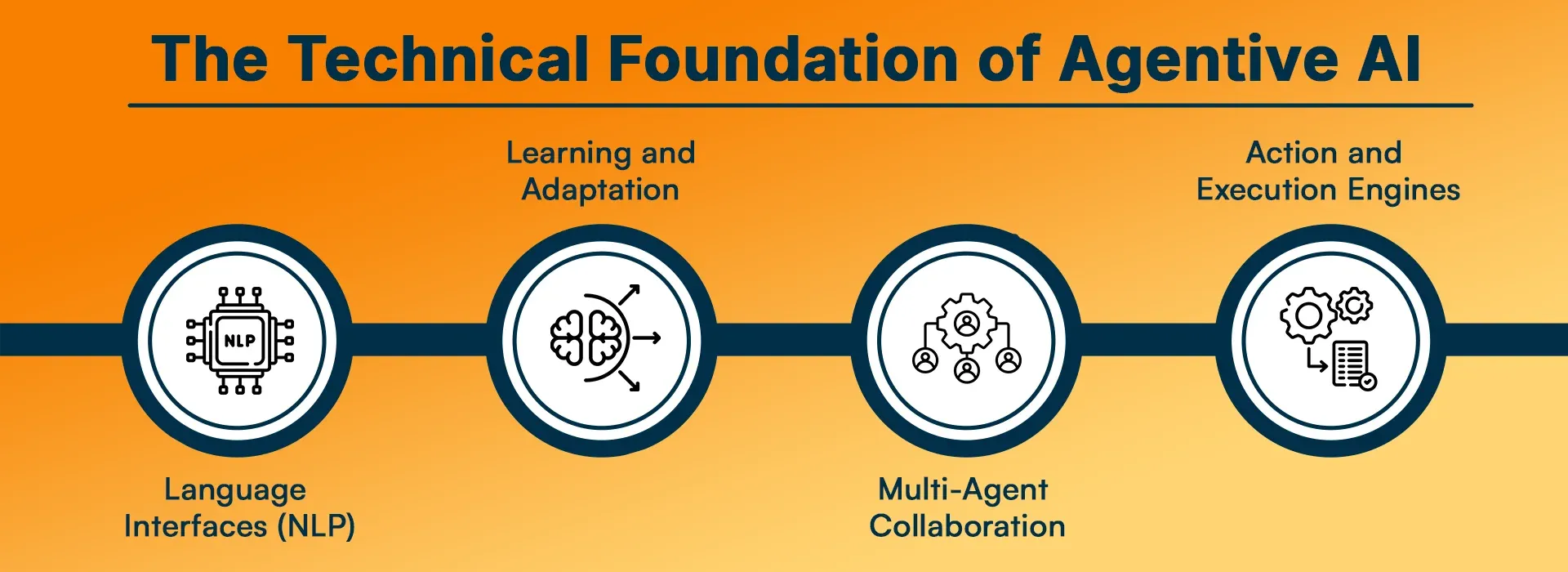
1. Language Interfaces (NLP): It is only by using this that machines or AI models understand our language. Using NLP, they interpret human instructions and then process the data accordingly and also give the final result in natural language so that we can understand.
Since AI models do not understand human language, they can only understand structured numerical data; hence, NLP, Human plays a very important role between machines and humans.
2. Learning and Adaptation: Learning and adaptation are very important for any AI model, because if it does not have this capability, then it will work like static AI.
So Agentive AI combines supervised and reinforcement learning to ensure continuous learning so that the performance of AI agents can be improved.
3. Multi-Agent Collaboration: If your business is large, then you can prefer Multi Agents, because multiple agentive systems can easily coordinate; in this, all AI agents perform their specific tasks, like an AI agent handles the demand, and another AI agent can also collaborate according to the supply chain and situation.
4. Action and Execution Engines: Such Agentive AI works like control centres in which rules, policies, and orchestration tools ensure timely execution. And due to this, they are able to make the execution perfect as well.
This layered foundation of Agentive AI creates not only a “smart assistant” but also an intelligent executor, due to which the working of advanced AI agents is quite structured.
Advantages of Agentive AI
I would like to tell you some of the main advantages of Agentive AI on the basis that I have seen Agentive AI being deployed in many businesses in my career and have also done proper ROI auditing of the same.
1. Increased Efficiency and Productivity: When you automate the complex workflows of your business, it drastically reduces a lot of manual intervention, and this not only saves valuable time for your staff but also reduces costs significantly.
For example, when we do auditing in Agentive AI operations, it can autonomously scan logs and easily flag any anomalies and give you proper reports accordingly.
2. Enhanced User Experience Through Proactive Assistance: Most customers don’t just want answers to their queries, but they want proper solutions to their problems too instantly, and when you solve your customer’s issue quickly, then their customer experience is enhanced, and they also become loyal to your brand. By using AI customer agents, businesses save 30% of their customer service costs.
For example: Global E-commerce companies like Amazon use proactive recommendations due to which not only solve the problem but also recommend the latest products.
Agentive AI creates a bridge between automation and anticipation, providing customers with smoother, faster, and more personalized interactions, saving a lot of time for human customer support and enhancing customer trust.
Best Practices for Successful Agentive AI Deployment
In my career, I have seen many businesses that used AI but still did not get better ROI, and there were many factors behind it, but the most important was that they did not use best practices, which we know about.
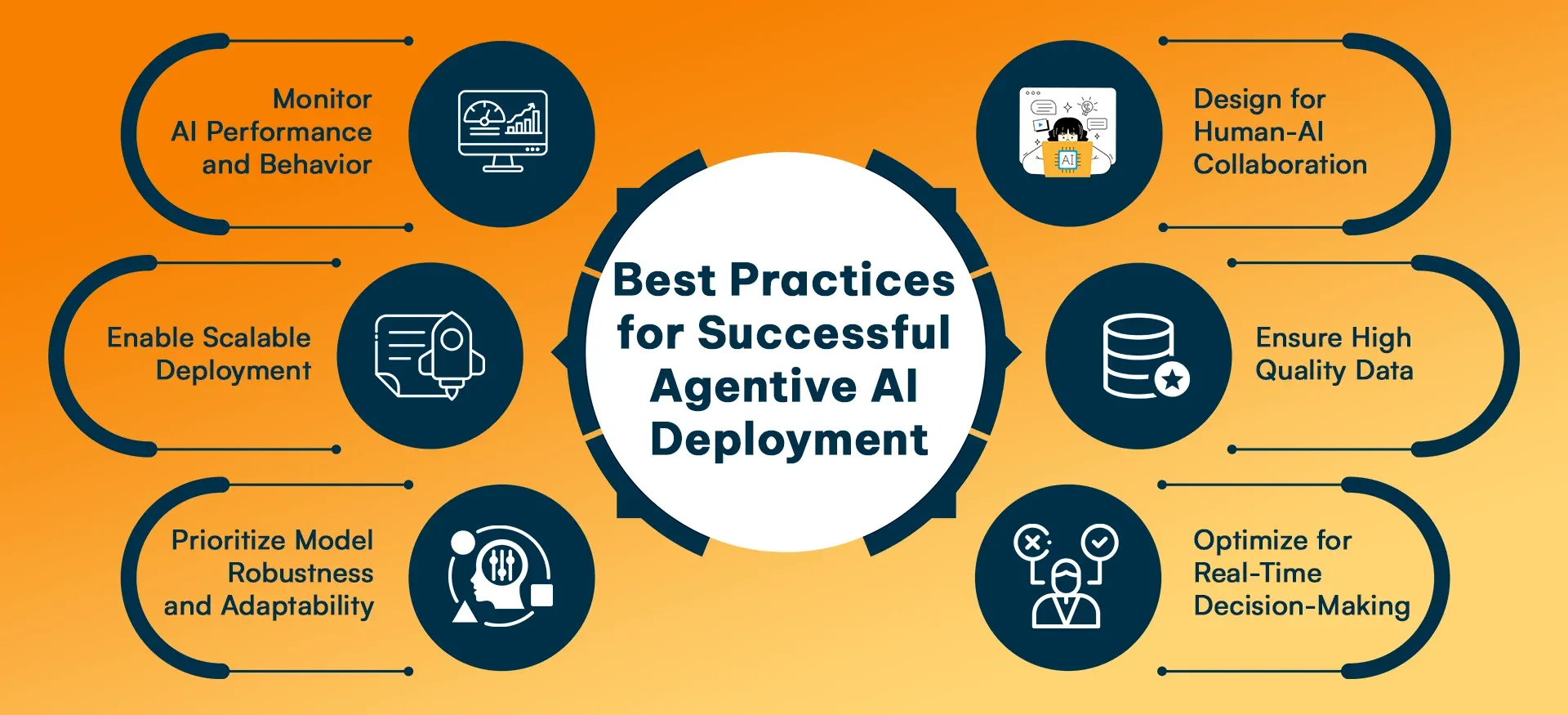
1. Design for Human-AI Collaboration: Always choose an AI partner who helps your staff in decision-making so that their overall productivity can be increased and they can spend their time on important projects; never prefer an agent whose focus is on replacing humans.
Because they can be profitable in the short term, but they can create a lot of complications in the long term.
2. Ensure High-Quality Data: Most advanced AI agents are trained using company workflow data so that they can give brand voice and provide personalization to the customer. Whenever you train AI agents, keep in mind that your training data should be clean, structured, and you should also update it regularly so that your AI's performance is maintained.
3. Optimize for Real-Time Decision-Making: Once your AI agent is deployed, test it before making it public and optimize it for real-time operations, because low-latency models and edge deployments keep improving responsiveness over time.
4. Prioritize Model Robustness and Adaptability: To make AI Agents perfect, it is very important that your AI agent is updated. For this, you should make regular updates in your business workflows, like CRM, be it guidelines or basic FAQ terms.
So that your AI agent can present only the latest data to your customer. Because old data can create bias in your system, and your customer trust also gets spoiled due to old data.
5. Enable Scalable Deployment: If you want scalability in your business, then you should use containerization like Kubernetes.
6. Monitor AI Performance and Behavior: Even after deploying AI agents, if you want to maintain ROI, it is very important that you keep track of all the errors and maintain regular auditing and focus on regular interface improvement to maintain user satisfaction.
If you follow these steps regularly, it will help you scale your business safely while maintaining the trust of your customers.
Implementing Agentive AI in Business
According to my consulting experience, implementing Agentive AI does not at all mean that you rush towards the technology; rather, there are many initial rules to be followed before implementing high-end technology like Agentive AI. Let's understand this in detail.
- Measuring Performance and ROI: Before deploying Agentive AI, they should analyze the efficiency gain and track their business. Apart from this, they should also audit the previous response time and analyze how much impact Agentive AI will have on their revenue.
- Assessment of Business Needs: Always automate repetitive workflows before using Agentive AI so that it can provide structured data according to your workflow so that you get maximum benefit from automation.
For example: A retailer will deploy AI for its dynamic inventory management, and a Bank’s core focus will be fraud detection. You start small before deploying Agentive AI and then scale your business with AI as per the value you get from it.
Conclusion
Don't make the mistake of thinking Agentive AI is just another trend, because most experts say it is set to be the next big player in the automation industry, as it gives proactive responses and is capable of making autonomous decisions that a reactive AI can't. And it will redefine how businesses will eventually interact with technology. Agentive AI has the ability to continuously learn and act independently, and most importantly, it respects human-defined boundaries, making Agentive AI stand out as a reliable model.
Many industries like healthcare, finance, retail, and logistics have started adopting it, and if you want a competitive edge in your business, then you must deploy experienced digital and AI solution firms like RejoiceHub. Because the businesses which will use Agentive AI today will also lead the market tomorrow.
Frequently Asked Questions
1. What is Agentive AI, and how does it differ from traditional AI?
Agentive AI reacts proactively and executes tasks autonomously and continuously adapts itself according to the situation, whereas traditional AI mainly reacts to inputs; it's not proactive.
2. What are the main benefits of using Agentive AI in business?
Agentive AI greatly enhances your productivity and provides you with proactive assistance, and also gives an improved user experience.
3. How does Agentive AI learn and improve over time?
Agentive AI keeps doing continuous feedback learning to improve itself; apart from this, it also has a special focus on reinforcement learning and supports adaptive data integration.
4. Can Agentive AI be integrated with existing systems?
Yes, you can integrate Agentive AI with existing APIs, CRMs, ERP systems, and cloud-native platforms.
5. What industries are benefiting most from Agentive AI?
Healthcare, finance, retail, logistics, manufacturing, and customer service Businesses are benefiting the most from Agentive AI.
6. Is Agentive AI safe for businesses?
Yes, it is safe as long as it is operated within human-aware boundaries and is properly monitored.
7. What’s the future potential of Agentive AI?
It is expected that it will evolve into a digital co-worker, handle complex workflows on its own, and provide businesses with a smarter choice.
